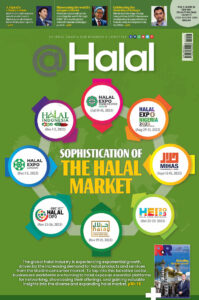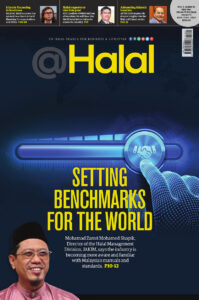
BY DR AZMI ABD AZIZ, Chief Technical Officer, Global Haltech
One of the essential factors for the halal industry’s success story is the growing global Muslim population
INTRODUCTION
Halal has become a significant issue in trading and trade-related matters. Many countries consider halal as a new trademark for marketing. Halal labelling serves as a medium for strengthening the belief of Muslim consumers. It guarantees the purity of products.
This promising large halal market has created intensified attention around the world. Muslim and non-Muslim countries are developing their own halal matters, certification processes, laws, and regulations to compete for the global halal market.
One of the essential factors for the halal industry’s success story is the growing global Muslim population which is now 1.8 billion, 23 per cent and expected to be 27 per cent by 2030. The halal economy is enormous and diverse, ranging from Islamic banking and “takaful” services to food and consumer products, with an estimated market size of US$2.3 trillion.
The increasing demand for halal products can be observed as the world’s Muslim population grows to two billion people in 57 countries, with most of the communities being Muslims. The rapid development of the global halal market is attributed to several supporting factors, such as increased population and purchasing power among Muslims worldwide.
In fact, the emergence of new halal markets is no longer limited to Islamic countries or even Muslim minorities have widened the opportunities for halal products. Raising awareness of halal values and interests among non-Muslims also contributes to developing this industry.
The halal industry is extensive and potential industry to develop. Based on the scope and environment of the halal industry, locally, Malaysia has taken a practical approach to promote the growth of the industry comprehensively. The government has provided various forms of platform, facilities and incentives.
In line with these goals, the government has given the authority to JAKIM as the central agency in Islamic affairs. Halal certification plays a crucial role in Malaysia’s food and beverage industry. This certification indicates that the food product complies with religion, safety and hygiene. Halal certification in Malaysia has many benefits in terms of higher market segment, hygiene and safety and the potential to gain interest from Muslim tourists worldwide to come to Malaysia.
For the global and international halal industry, JAKIM has recognised 84 foreign halal certification agencies covering 46 countries. The recognition is based on compliance and halal standards implementation that meet Malaysia’s requirements. This recognition aims to meet procedures set by Malaysia halal certification that require imported ingredients to be certified by recognised bodies.
Malaysia’s halal certification is recognised internationally. Recognition of Malaysian halal certificates and logos internationally is closely related to market access. Since 2009, JAKIM has organised a Halal Certification Body Convention annually to ensure that international bodies take Malaysia’s halal certification system as a highly trusted model.
Increased participation of international certification bodies in the annual Overseas Islamic Bodies Conference indicates acceptance of Malaysian halal standards by foreign countries. This conference is a forum for Malaysia to share and gather information, inform the latest developments of Halal Malaysia, and harmonise differences among certification bodies involved.
In effect, Malaysia’s halal industry can penetrate the international halal market and has the credibility and integrity to attract demand for halal products and services from the growing Muslim population worldwide. World recognition has placed Malaysia as a significant global reference centre.
Halal products and services such as food, confectioneries, food ingredients, consumer goods, logistics, cosmetics and pharmaceuticals have drawn much attention from the local and international community, especially in Muslim countries.
GOVERNANCE IN THE HALAL INDUSTRY
The halal industry in Malaysia has been increasing since four decades ago. It can be said that two main factors contributed to the positive development of the halal sector:
• Muslim needs, awareness, and demands,
• support from the authority in regulating the halal certification process.
Governance is a crucial component in the halal industry. Appropriate mechanisms should be created to ensure halal-certified companies comply with Shariah principles. Establishing a proper Shariah governance framework for the halal industry will boost the confidence of the shareholders and the public that all the practices and activities follow Shariah all the time.
The Trade Descriptions Act 2011 (Act 730), the Trade Descriptions (Certification and Marking of Halal) Order 2011, has named JAKIM and the State Islamic Religious Council (MAIN) as the Authoritative Authority to issue halal certificates in Malaysia (Federal Government Gazette, 2011).
JAKIM and the Council / Islamic Religious Affairs Department (MAIN/JAIN) are the Authorised Authorities in issuing Malaysia’s Halal Certification Certificate as stated in Section 3 of the Trade Descriptions Act 2011. The authorisation makes JAKIM and MAIN / JAIN as Malaysia’s Halal Certification Leader.
Currently, halal-specific laws have not been established to control and enforce offences related to halal products that can be identified as the ‘Halal Act’. Halal enforcement implemented by the government currently depends on several different laws, whether directly or indirectly related to the control of halal products and is enforced by various agencies.
The strength and uniqueness of the halal ecosystem in Malaysia is due to its management that remains in regulatory and government governance. Since Islamic affairs are the prerogative of the Malay Rulers per the Federal Constitution, halal-related affairs are always preserved under the jurisdiction of the States. Hence, the involvement of State Religious Authorities in the halal industry is no longer limited to certification activities.
THE IMPORTANCE OF THE HALAL INDUSTRY IN SOCIAL ASPECTS
Halal products are essential to all Muslim consumers. Nonetheless, non-Muslim consumers are now aware of the importance of halal products in their daily lives. This awareness contributes to production growth for potential halal products due to the increasing demand in the country.
Halal is not limited to one ‘guiding principle’ in the supply chain of halal products, but it has covered the entire halal ecosystem itself. Therefore, it is vital to increase the level of understanding of the Halalan-Thoyyiban concept among consumers in the country. In addition, risk action plans need to be streamlined for better management in the future.
With an effective communication strategy, Muslim and non-Muslim consumers will be aware of the importance of halal value in life, have confidence, and use more halal products and services. Indirectly, this scenario will positively impact sales of halal products and services.
SUMMARY
Malaysia has always been considered a respected, progressive and highly regarded Islamic country. The development of the halal industry in Malaysia, which has successfully penetrated the international halal market, especially in the food sector, has further boosted the country’s reputation.
Malaysia’s current halal industry landscape focuses not only on the food and beverage sector alone but also expands into several other sectors such as cosmetics, pharmaceuticals, logistics, consumable goods and original equipment manufacturer (OEM).
The rapid development of halal-related industries has become more diverse and complex. Hence, the development of halal-related sectors should be taken seriously to further contribute to and generate the country’s economic growth.
The achievement of integrity alone is not enough to maintain and strengthen Malaysia to remain the world’s halal leader. Even though halal management in the country has been stable regarding standards and certification, some identified challenges still need to be addressed to drive Malaysia’s halal industry to a better level.
The authorities should implement clear guidelines on halal governance to build stakeholders’ confidence in the industry. The halal industry is not only about the halalness of the products or services but should also focus on if the company is managed according to the true Shariah spirit. The government should provide Incentives to halal companies that practice proper Shariah corporate governance.








